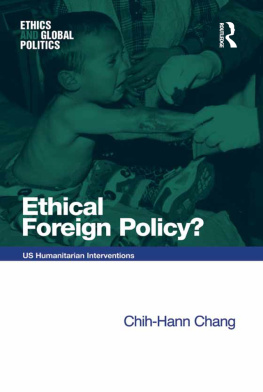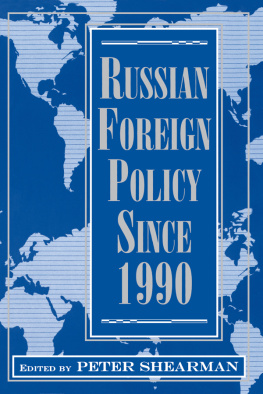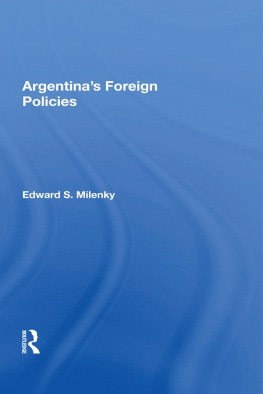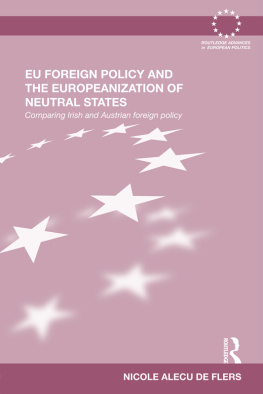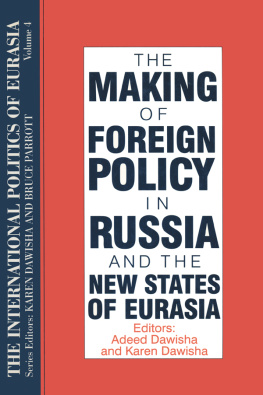IN THE SHADOW OF THE GENERALS
For Deirdre
In the Shadow of the Generals
Foreign Policy Making in Argentina, Brazil and Chile
Martin Mullins
University of Limerick, Ireland
First published 2006 by Ashgate Publishing
Reissued 2018 by Routledge
2 Park Square, Milton Park, Abingdon, Oxon, OX14 4RN
711 Third Avenue, New York, NY 10017, USA
Routledge is an imprint of the Taylor & Francis Group, an informa business
Martin Mullins 2006
Martin Mullins has asserted his moral right under the Copyright, Designs and Patents Act, 1988, to be identified as the author of this work.
All rights reserved. No part of this book may be reprinted or reproduced or utilised in any form or by any electronic, mechanical, or other means, now known or hereafter invented, including photocopying and recording, or in any information storage or retrieval system, without permission in writing from the publishers.
A Library of Congress record exists under LC control number: 2006929152
Notice:
Product or corporate names may be trademarks or registered trademarks, and are used only for identification and explanation without intent to infringe.
Publishers Note
The publisher has gone to great lengths to ensure the quality of this reprint but points out that some imperfections in the original copies may be apparent.
Disclaimer
The publisher has made every effort to trace copyright holders and welcomes correspondence from those they have been unable to contact.
ISBN 13: 978-0-815-38968-2 (hbk)
ISBN 13: 978-1-351-15580-9 (ebk)
This is a propitious time for a study of the foreign relations of the Southern Cone. States across South America are becoming increasingly strident in their dealings with the United States and the wider world. Changes in the global political economy have afforded Argentina, Brazil and Chile more autonomy and as a consequence hemispheric relations are now in a time of flux. The political presence of Hugo Chavez, the impending Venezuelan entry into Mercosur and the election of Evo Morales in Bolivia are liable to complicate matters further. Power relations around the world are changing and Brazil is now an important player in global diplomacy. The existence of Mercosur lends weight to Brazil in trade talks and increases the profile of Argentina. The two countries have put aside their historic rivalry and have built a strong relationship, particularly in the area of external relations. This book examines the prospects for a hemispheric free trade agreement and the probable future course of the Mercosur project.
This work also addresses theoretical concerns in the discipline of International Relations. The task of explaining foreign policy formation in the Southern Cone calls for an inclusive methodology. The regions history, relations between civilian powers and the military and the imperative of development are all important drivers of foreign policy in the Southern Cone. Interpretive techniques are required to gain an understanding of both the continuities and discontinuities in the area of foreign policy. The case of Argentina, in particular, demonstrates the limits of those approaches that focus exclusively on the relative power and capabilities of nation states. The aim of this work is to bring local circumstances into view and demonstrate the salience of national political cultures to the discipline of international relations.

Chapter 1
Introduction
The subject of this book is the foreign policies of Brazil, Argentina and Chile. The relative importance of the various drivers of foreign policy formation in the three countries will be considered. This work addresses the historical evolution of foreign policy in the Southern Cone and examines the impact of the dictatorships of the 1980s on this area of policy. The impact of identity politics and evolving historical narrative constitutes an important element of this study. The aim is to provide the reader with an understanding of the political and cultural factors that have shaped foreign policy formation in Brasilia, Buenos Aires and Santiago.
For over a century these three countries have jockeyed for position in the Southern Cone of Latin America. The relative power and influence of the three ABC countries (Argentina, Brazil and Chile) has changed dramatically over time and today it is Brazil that represents the dominant force. This, in itself, has profound implications for international relations in the region as Brazil seeks to assert itself across the wider continent and project its influence globally. The study of foreign policy in the Southern Cone is of interest in and of itself, however, it also serves to illuminate many of the key issues facing global polity today. Firstly, relations with the hemispheres hegemonic power, the United States, have long been a central concern of policy planners in the region, as has the related matter of US interventionism. Secondly, the study also illustrates the political dynamics of an emerging regional trade bloc, namely Mercosur. The key question facing the nations of the Southern Cone is whether the Mercosur agreement will be superseded and absorbed by a wider regional arrangement. Thirdly, the book examines the implications of the emergence of a nascent regional power, in this case Brazil. Fourthly, this work examines the dynamics of international relations at the periphery of world system.
A key unit of analysis in this work will be Mercosur. Established in 1991, it is the most important economic grouping in Latin America. The organization is made up of Argentina, Brazil, Paraguay and Uruguay. In 1996, Chile was granted associate status, this allowed Santiago to pursue bilateral trade negotiations with third parties whilst maintaining a formal link with the regional trade bloc.1990s, the grouping experienced a series of crises as relations cooled between the two principals, Argentina and Brazil. However, post 2000, the prognosis for the pact is more positive. Mercosur is no longer faced with a sceptical Argentine government, which under ex-president Menem in the 1990s, had favoured good relations with the United States over those with its Mercosur partners. For Brazil, the Mercosur project lies at the heart of its foreign policy. The trade bloc represents both a method of projecting itself more effectively in the wider world and of resisting US domination in the Southern Cone of Latin America. The smaller countries of the region are facing a dilemma as to whether or not to fall in behind Brazil and Argentina in creating a viable alternative to a hemispheric free-trade area led by the United States. The success or failure of Mercosur will to a large extent determine the future shape of international relations in the region and so determine the foreign relations of Argentina, Brazil and Chile over the longer term.
Foreign policy formation in less powerful nations receives little attention. From the realist perspective, power is the primary determinant in the area of international relations and so the focus is directed onto the locations where power is concentrated. The dominant theme of such literature is the foreign policy of the United States. Other large players also attract attention; the European Union represents a formidable force in economic diplomacy around the world and is able to challenge the United States in this area. In the case of Latin America, the power exerted by the United States has obscured the dynamics of inter-state policies in the region. This is beginning to change; the increasing global profile of Brazil, the seeming durability of the Mercosur project and the emergence of a more strident leadership across the continent is generating interest in foreign policy making in Latin America.





